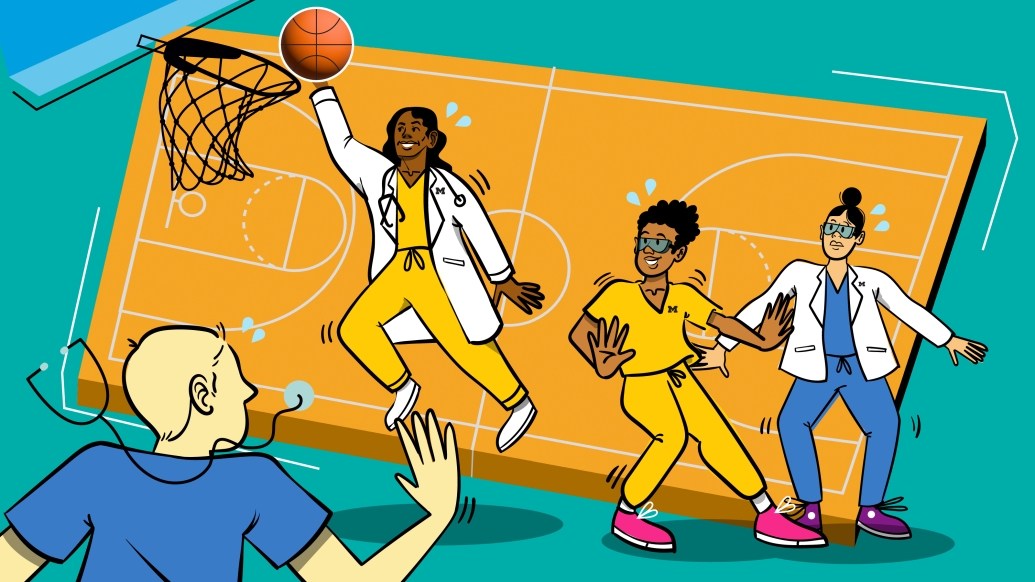Vote now to support Michigan Medicine research on COVID-19 disparities, inflammation biomarkers, depression and gut microbes in fun competition
8:00 AM
Author |

Update: One U-M team remains in STAT Madness in the third round of competition. Vote today for the team representing the Eisenberg Family Depression Center
The bracket is set. The teams are ready. The title is on the line. And the Wolverines are looking strong.
Now it’s up to University of Michigan fans to make the difference by voting in a fun national tournament of science.
Four research teams, all led by researchers from Michigan Medicine, have been picked for the STAT Madness tournament, run by the STAT health news organization.
Starting today, until Tuesday night, March 7, the U-M entries need as many votes as possible to help them defeat their opponents from other research universities and institutes to advance to the next round. Each team in the bracket is represented by a paper they published in 2022.
Wolverines won the tournament in 2019, and have made it far in other years. Now these team entries need support – and anyone can vote for once daily all four:
- Gut microbes that help us eat sushi: Any fan of California rolls and other foods involving edible seaweed should root for research on how the bacteria in our digestive system gained the ability to break down starches from sea plants. The discovery, made by a team led by Nicolas Pudlo, Ph.D., Gabriel Vasconcelos Pereira, Ph.D., and Eric Martens, Ph.D., of the Medical School’s Department of Microbiology & Immunology, has importance beyond sushi; it gives insights into how the gut microbiome adapts when food supply changes. Learn more about the work, which was published in Cell Host & Microbe and is competing in STAT Madness under the Michigan Medicine banner.
- What ZIP code has to do with severe COVID-19: The pandemic has laid bare some stark inequalities in health risk, and a U-M study helps show just how serious the situation is. A team led by Renuka Tipirneni, M.D., M.Sc., of General Medicine, showed that the ZIP codes patients with severe COVID-19 came from had a lot to do with how sick they were when they got to the hospital, and how much care they needed once they were there. Read more about the work, published in Annals of Internal Medicine, which is competing under the banner of the Institute for Healthcare Policy and Innovation.
- Key factors in COVID-19’s toll on people with diabetes: A team led by Salim Hayek, M.D., of Cardiovascular Medicine has worked for years to study a biomarker of inflammation called suPAR, and its role in cardiovascular disease. The study that made the bracket involved Alexi Vasbinder, Ph.D., R.N., and Rodica Pop-Busui, M.D., Ph.D. and a host of others. The research -- on how suPAR and high blood sugar both affect the impact of the novel coronavirus on people with diabetes -- sheds light on why people with this condition make up 40% of hospitalized COVID-19 patients. Learn more about the study, which was published in Diabetes Care and is competing under the banner of the Frankel Cardiovascular Center.
- Long work hours and higher risk of depression: This isn’t the first trip to the STAT Madness tournament for a team using data from the Intern Health Study led by Srijan Sen, M.D., Ph.D. In 2020, they competed with a paper on the impact of intense stress on the DNA of new doctors. Now they’re back with another study, co-led by Yu Fang, MSE, and Amy Bohnert, Ph.D., that shows that the risk of developing depression rises with the number of hours worked in a stressful job. Learn more about the work, published in the New England Journal of Medicine and competing under the Eisenberg Family Depression Center banner.
The field of competitors will narrow week by week until the final two teams are standing — right at the end of college basketball’s March Madness in early April.
Anyone can sign up to receive updates when each new round of voting begins. Anyone can vote once per day in each contest in the current bracket.
In addition to the 2019 title, claimed by a team led by Susan Shore, Ph.D., of Otolaryngology, Michigan Medicine made it to the Round of 8 in STAT Madness 2018 with an entry focused on antibiotic-resistant microbes in nursing homes led by Lona Mody, M.D. and Evan Snitkin, Ph.D., and in 2020 with Sen’s team’s paper on stress and DNA. In 2017, the first year of the tournament, another microbiome discovery made by a team led by Robert Dickson, M.D., made it to the final round for a paper on the microbes that inhabit human lungs.

Department of Communication at Michigan Medicine
Want top health & research news weekly? Sign up for Health Lab’s newsletters today!





